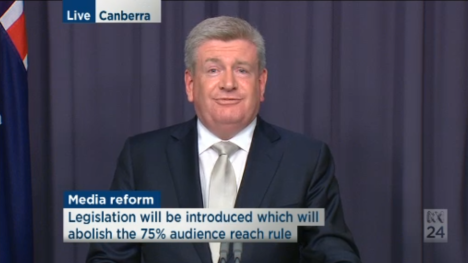Government confirms media reforms including abolition of reach rule and two-thirds rule
The Coalition Government has today confirmed it will move to abolish both the ‘reach’ rule and ‘two out of three’ ownership rule, but has announced “new and higher” local content protections.

Fifield: “Obviously the environment has changed dramatically.”
In a press conference this afternoon, Communications Minister Mitch Fifield confirmed that he would be presenting to parliament a media reform package tomorrow that will likely pave the way for a wave of media mergers and acquisitions.
While the abolition of the ‘reach rule and ‘two out of three rule’ had been expected; however, the new local content rules come after pressure from National and rural Liberal MPs who were concerned the impact of the reforms on regional stations.


Game on!
Long overdue to save the regionals from a legislative boxed in position. They don’t own their spectrum, they don’t own the signal content, and a good regional like Sunshine (owned by 7), or NBN (owned by NEC) do superb jobs on local content in Queensland and NSW respectively, anyhow.
Relaxing the 2 to of 3 rule to 3 out of 3 serves to allow everybody else to somewhat catch News ,which effectively has 5 out of 4 (5= APN, Foxtel, TEN, newspapers, DMG).
One could see another TEN network rip off if Foxtel floats into TEN rather than Foxtel /News buying TEN. Telstra can then get out of pay TV. Foxtel, long term – say 2020 – might not be a profitable company, or anywhere near current profits. SWM may, if TEN is then so heavily integrated with News/Foxtel /DMG/Austereo, leave Presto Live and shift to Stan. These are some of the major undercurrents that should cause a metro TV network and Fairfax merging.
The writer holds shares in TEN – mistake so far